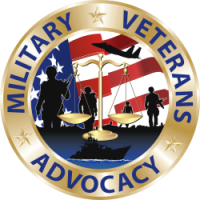Public education and outreach is a major goal of Military-Veterans Advocacy® (MVA). Through conventional media and modern social media, we will keep the public informed of military and veteran concerns. A frequent guest in the news media, MVA has also established working relations with many media outlets. MVA will provide speakers for military and veterans groups as well as other civic groups. We also conduct Continuing Legal Education programs for attorneys and have been certified by the State of Louisiana to do so.
Reach out to us on Social Media
Attorneys can view our continuing legal education seminar here
Other Than Honorable Discharges
Letter to Stanford
Click here to view our letter sent to Stanford regarding their list of "harmful" words.
Click here to view our letter sent to Stanford regarding their list of "harmful" words.
How Veterans Can Qualify for SSD Benefits at the Same Time as VA Disability
Did you know that veterans receiving VA disability are often eligible for additional benefits? The Social Security Administration (SSA) offers monthly financial aid for people with disabilities who are unable to work. If you’ve already been approved for VA disability, you may be eligible for more. Best of all, the two programs will not affect one another. Here are a few big differences between VA disability and Social Security disability:
Total Vs. Partial Disability
While veterans will receive benefits for injuries or illnesses starting at a 10% disabled level, the same will not be true for Social Security benefits. Social Security disability is an “all or nothing” program, meaning you’ll be completely unable to work to qualify. This means that veterans with a disability rating under 50% may have a tough time qualifying.
An exception would of course be if you were diagnosed with an illness that’s not related to your VA disability rating. For example, if a veteran retired from the service with a 20% disability rating but was diagnosed with lung cancer two years later, he may still have a great chance of qualifying for Social Security.
You’ll Need to Have Worked Recently
Most Social Security benefits are only awarded to people who have worked, and have worked recently. While you can apply for VA disability any time after you leave the service, you will not be eligible for Social Security disability more than five years after you stop working. This is why it’s important to apply for Social Security disability as soon as you’re disabled. Especially if you are over the age of 50 since Social Security disability rules after age 50 change.
This does not mean you have to apply for Social Security after you leave the service if you plan on working! Many veterans have a new career after their military retirement and will later qualify for Social Security. So long as you earn around $5,000 in taxable income per year, you’ll maintain your Social Security disability eligibility.
One Program Helps The Other
If you’re already approved for VA disability, you’ll have a better chance of qualifying for Social Security benefits when compared to a civilian. This is because the SSA acknowledges the importance of another government organization approving your disability. The same can’t be said if you’re already on Social Security disability and applying for VA disability—because VA disability benefits are only awarded to those who have a disability while on active duty, your Social Security approval is not important.
In fact, the SSA has specific procedures in place to ensure wounded warriors’ claims will be processed quickly. If you were injured on or after October 1, 2001, or if you have a 100% P&T disability rating, your claim will be processed in as little as two weeks. Just mark your status as a veteran on the final page of the Social Security application where there’s a blank space for notes and further comments.
Starting Your Application
The easiest way to apply for Social Security disability benefits is online on the SSA’s website. You can even save your progress to be completed on a later date if you’d like. If you need help filing for disability, you can schedule an appointment at your local SSA office. It will typically take the SSA three to five months to process a claim, but again, if you are a wounded warrior your claim will be expedited automatically. Once approved, you can focus on what’s important: returning to civilian life.
Source Cited:
Did you know that veterans receiving VA disability are often eligible for additional benefits? The Social Security Administration (SSA) offers monthly financial aid for people with disabilities who are unable to work. If you’ve already been approved for VA disability, you may be eligible for more. Best of all, the two programs will not affect one another. Here are a few big differences between VA disability and Social Security disability:
Total Vs. Partial Disability
While veterans will receive benefits for injuries or illnesses starting at a 10% disabled level, the same will not be true for Social Security benefits. Social Security disability is an “all or nothing” program, meaning you’ll be completely unable to work to qualify. This means that veterans with a disability rating under 50% may have a tough time qualifying.
An exception would of course be if you were diagnosed with an illness that’s not related to your VA disability rating. For example, if a veteran retired from the service with a 20% disability rating but was diagnosed with lung cancer two years later, he may still have a great chance of qualifying for Social Security.
You’ll Need to Have Worked Recently
Most Social Security benefits are only awarded to people who have worked, and have worked recently. While you can apply for VA disability any time after you leave the service, you will not be eligible for Social Security disability more than five years after you stop working. This is why it’s important to apply for Social Security disability as soon as you’re disabled. Especially if you are over the age of 50 since Social Security disability rules after age 50 change.
This does not mean you have to apply for Social Security after you leave the service if you plan on working! Many veterans have a new career after their military retirement and will later qualify for Social Security. So long as you earn around $5,000 in taxable income per year, you’ll maintain your Social Security disability eligibility.
One Program Helps The Other
If you’re already approved for VA disability, you’ll have a better chance of qualifying for Social Security benefits when compared to a civilian. This is because the SSA acknowledges the importance of another government organization approving your disability. The same can’t be said if you’re already on Social Security disability and applying for VA disability—because VA disability benefits are only awarded to those who have a disability while on active duty, your Social Security approval is not important.
In fact, the SSA has specific procedures in place to ensure wounded warriors’ claims will be processed quickly. If you were injured on or after October 1, 2001, or if you have a 100% P&T disability rating, your claim will be processed in as little as two weeks. Just mark your status as a veteran on the final page of the Social Security application where there’s a blank space for notes and further comments.
Starting Your Application
The easiest way to apply for Social Security disability benefits is online on the SSA’s website. You can even save your progress to be completed on a later date if you’d like. If you need help filing for disability, you can schedule an appointment at your local SSA office. It will typically take the SSA three to five months to process a claim, but again, if you are a wounded warrior your claim will be expedited automatically. Once approved, you can focus on what’s important: returning to civilian life.
Source Cited:
- va.gov
- https://www.ssa.gov/
- https://www.ssa.gov/planners/disability/qualify.html
- https://www.ssa.gov/pubs/EN-05-10030.pdf
- https://www.disabilitybenefitscenter.org/qualifying-over-50
- https://www.ssa.gov/people/veterans/100pt.html
- https://secure.ssa.gov/iClaim/dib
- https://www.disabilitybenefitscenter.org/blog/help-apply-for-benefits


